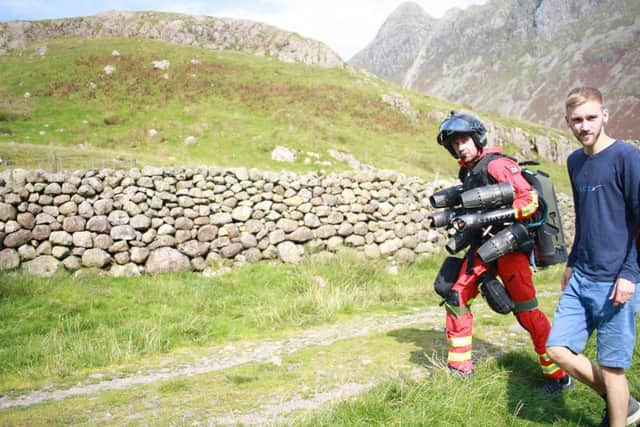Watch the test flight of 'awesome' jet suits that could be the future of Peak District mountain rescue
and live on Freeview channel 276
Mountain rescue teams across the world looked on with interest into how it could impact their future work. The paramedic made it to a remote point in the Lake District’s Langdale Pikes in just 90 seconds, when it would usually take almost half an hour on foot.
The 1050 brake horsepower jet suit was secretly tested by the Great North Air Ambulance Service (GNAAS) after a year of talks between the charity and British engineering firm Gravity Industries.


Advertisement
Hide AdAdvertisement
Hide AdThe test flight was a world first, offering onlookers an idea as to what might be available to mountain rescue teams and air ambulance crews in the future.
Matt Dooley, chairman of the Peak District Mountain Rescue Organisation, was one of those taking a keen interest in the news.
He said: “I saw the news regards the Great North Air Ambulance Service and the testing of a Jet suit to rapidly deploy paramedics onto the hill to deliver vital first aid and pain relief.
"We will keep a keen eye on the trial and how the jet suit could compliment Mountain Rescue here in the Peak District in the future."
Advertisement
Hide AdAdvertisement
Hide AdHowever, Mr Dooley added that the widespread use of jet suits could be a long way off due to the cost.
“Whilst this is an exciting development and we could see natural cross overs for mountain rescue, the cost of an initiative such as this to volunteer mountain rescue teams within the Peak District Mountain Rescue Organisation would be prohibitive especially given the fact we solely rely on public donations to buy our equipment. We also generally operate at night and in poor weather,” he said.
The test, held secretly on September 8 at the Langdale Pikes, saw Gravity Industries founder and chief test pilot Richard Browning fly from the valley bottom to a simulated casualty site, which would take around 25 minutes to reach by foot.
The Gravity Jet Suit is able to cover that distance in 90 seconds.
Advertisement
Hide AdAdvertisement
Hide AdAndy Mawson, director of operations and paramedic at GNAAS, identified the Lakes as a possible location for a Jet Suit paramedic after hearing of Mr Browning’s work and then studying the charity’s own call-out data.
He said: “It showed dozens of patients every month within the complex but relatively small geographical footprint of the Lakes.
“We could see the need. What we didn’t know for sure is how this would work in practice. Well we’ve seen it now and it is, quite honestly, awesome.”
Mr Mawson added: “In a time in healthcare when we are exhausted with COVID and its effects, it’s important to still push the boundaries.
Advertisement
Hide AdAdvertisement
Hide Ad“Our aircraft will remain a vital part of the emergency response in this terrain, as will the fantastic mountain rescue teams. But this is about looking at supplementing those resources with something completely new.”